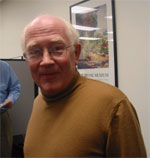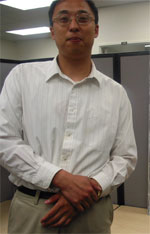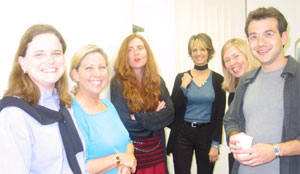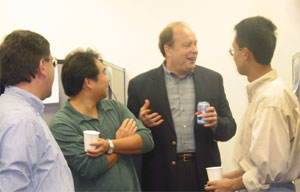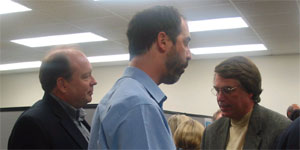CPCC: Yesterday, Today and Tomorrow

6.30.03 - On June 19, 2003, exactly three years to the day of its inauguration, the Center for Pervasive Communications and Computing (CPCC) opened the doors of its research facility on the campus of the University of California, Irvine (UCI) and unveiled its logo, designed by a team from Conexant Systems, Inc. An academic partner of the California Institute for Telecommunications and Information Technology (Calit²), the CPCC conducts research in areas covering the broad spectrum of communications and computing in electrical engineering and computer science.
The CPCC was established on June 19, 2000, in a ceremony held at UCI campus. California Governor Gray Davis, UCI Chancellor Ralph J. Cicerone, Dean of the Henry Samueli School of Engineering Nicolaos G. Alexopoulos, and Dwight Decker and Henry Samueli, executives from Conexant Systems, Inc. and Broadcom Corp., inaugurated a unique alliance among industry, the university, and the state. By creating the CPCC, this alliance made a commitment to support research and education in emerging communications technologies. The goal is to influence and direct this technology area which promises to change the way people access and use information.
During the inauguration ceremony three years ago, Alexopoulos stated that a critical goal of the school is to create a well-trained workforce for local companies and to provide these companies with access to faculty expertise. “Achieving both of these goals adds to the economic base of the county, the state, the nation, and ultimately, the world,” he said. The June 19, 2003 open house of the CPCC marked a key milestone towards technology transfer and overall cooperation between industry, academia and state government.
|
At the CPCC open house, Alexopoulos reiterated that “Dwight Decker at Conexant and Henry Samueli at Broadcom had the vision to jumpstart a world-class research center and the generosity to put together the gift to make it happen.” The $6M gift from these local high-tech industry leaders provided CPCC startup funding for faculty and graduate fellowships. With obvious gratitude and appreciation to industry supporters Broadcom and Conexant, and in addition, to CPCC Director Ender Ayanoglu, Alexopoulos said, “it was only when Ender showed up to take this job and created a number of much needed activities, that it all came together for the CPCC. I thank them, and hope that in two years we will have one of the best communications groups in the world.”
CPCC Director Ayanoglu reiterated his vision to the guests at CPCC’s open house. “We will take a very active role in research for next-generation communications and computing technologies. These areas are critical for the U.S. to remain a leader in high technology development. We have a good plan and a now a good facility. We will work closely with the technical community and standards bodies at first targeting the areas of next generation wireless LANs, wireless telephony, optical communications, and networking.” Asked about potential challenges, Ayanoglu said “of course the economy is still in a downturn, but this is actually a good time to acquire people resources.” “Perhaps a bigger challenge is to get used to this new operating mode in academia, but we have made a lot of progress” added Ayanoglu.
Bill Parker, interim UCI division director of Calit², told guests that “Communications and computing research will be at the heart of the institute. The new Calit² facility being built will accommodate a CPCC 8 to 10 times the size of what is here now. The CPCC is the centerpiece of the institute at UCI, addressing the technologies of the future.”
In welcoming comments at the open house, Dwight Decker, Chairman and CEO of Conexant Systems Inc., said he is very pleased with the progress of Calit². “There is real light to this institute,” Decker said. He believed from the beginning that the establishment of the CPCC would create a “talent incubator” for local businesses. Bringing the guests’ attention to the CPCC logo, Decker said that he believes it can help build an identity for the center and the institute, to enhance UCI’s image as a major technology player here in Orange County and the nation.
Decker was personally involved in the design of the logo and its message: communications all the time, everywhere. “The logo intelligently combines the acronym for the center with subtle visuals of an antenna propagating waves, representing communications, and binary numbers, representing computing,” Ayanoglu said.
Since the inception of the CPCC in 2000, many pieces had to come together before holding an open house. “2003 has been the critical set-up year, gaining visibility, space, and people in addition to taking research inventory,” Ayanoglu said. “Looking ahead into 2004, we expect to investigate new trends and solidify research goals, and working with other organizations on campus, we will launch major research programs with funding proposals to federal, state, and corporate organizations.”
For more information see http://www.eng.uci.edu/cpcc/
|

